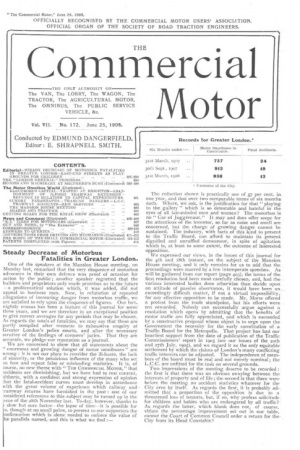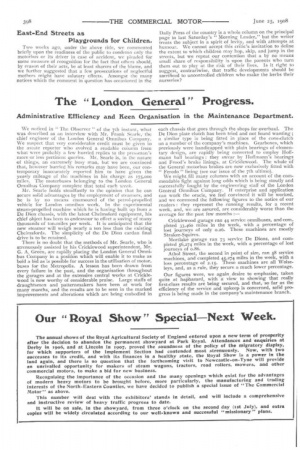Steady Decrease of Motorbus Fatalities in Greater London.
Page 1

Page 2

If you've noticed an error in this article please click here to report it so we can fix it.
One of the speakers at the Mansion House meeting, on Monday last, remarked that the very eloquence of motorbus advocates in their own defence was proof of occasion fcir action by the public ; another speaker regretted that the builders and proprietors only made promises as to the future —a problematical solution which, it was added, did not appeal to business men. Now, in refutation of repeated allegations of increasing danger from motorbus traffic, we are satisfied to rely upon the eloquence of figures. Our fortnightly census has been a feature of this journal for some three years, and we are therefore in an exceptional position to give correct averages for any periods that may be chosen. As regards the totals of fatalities, we may say that these are partly compiled after recourse to exhaustive enquiry at Greater London's police courts, and after the necessary scrutiny of the findings of coroners' juries. That they are accurate, we pledge our reputation as a journal.
We are concerned to show that all statements about the " enormous and growing danger of motor omnibuses" are wrong : it is not our place to consider the ill-haste, the lack of sincerity, or the pernicious influence of the many who set on foot and repeat false or misleading statistics. It is, of :ourse, DO new theme with " THE COMMERCIAL MOTOR," that iecidents are diminishing, but we have had to rest content, iitherto, with a confident and strong expression of opinion :hat the fatal-accident curves must develop in accordance with the great volume of experience which railway and • rramwav returns have furnished in the past : one of our :onsidered references to this subject may be turned up in the ssue of the 28th November last. To-day, however, thanks to slow but sure factor—the lapse of time—it is possible for s, though at no small pains, to present to our supporters the onfirtnation which is alone needed to enforce the value of he parallels named,•and this is what we find :— The reduction shown is practically one of 57 per cent. in one year, and that over two comparable terms of six monthseach. Where, we ask, is the justification for that "playing to the gallery" which is so detestable and hateful in the eyes of all fair-minded men and women? The motorbus is no "Car of Juggernaut." It may and does offer scope for the attentions of the inventor, so far as noise and smell are concerned, but the charge of growing danger cannot be sustained. The industry, with facts of this kind to present to the Traffic Board, can afford to maintain its present dignified and unruffled demeanour, in spite of agitation which is, at least to some extent, the outcome of interested opposition.
We expressed our views, in the issues of this journal for the 4th and 18th instant, on the subject of the Mansion House meeting, and it only remains for us to add that the proceedings were marred by a few intemperate speeches. As will be gathered from our report (page 403), the terms of the first resolution had been most carefully chosen, and, had the . various interested bodies done otherwise than decide upon an attitude of passive observance, it would have been an exceedingly difficult matter, if not a virtual impossibility, for any effective opposition to be made. Mr. Morse offered a protest from the trade standpoint, but his efforts were not rewarded. Nobody can successfully argue against a resolution which opens by admitting that the benefits of motor traffic are fully appreciated, and which is succeeded by a constructive proposal whose object is to urge upon theGovernment the necessity for the early constitution of a Traffic Board for the Metropolis. That project has had our heartiest support from the date of publication of the Traffic Commissioners' report in 1905 (see our issues of the 2oth and 27th July, 1905), and we regard it as the only equitable settlement by which the claims of London's many conflicting traffic interests can be adjusted. The independence of members of the board must be real and not merely nominal; the L.C.C. are unfitted for the task on several grounds.
Two impressions of the meeting deserve to be recorded : the first is that there was an obvious swaying between the interests of property and of life; the second is that there were before the meeting no accident statistics whatever for the City area by itself. As regards the first, it is probably admitted that a proportion of the opposition is due to a threatened loss of tenants, but, if so, why profess solicitude for children and babies who are endangered by all traffic? As regards the latter, which blank does not, of course, vitiate the percentage improvement set out in our table, cannot the Court of Common Council order a return for the. City from its Head Constable?
East-End Streets as Playgrounds for Children.
Two weeks ago, under the above title, we commented briefly upon the readiness of the public to condemn only the motorbus or its driver in case of accident, we pleaded for some measure of recognition for the fact that others should, by reason of their acts, be at least sharers of the blame, and we further suggested that a few prosecutions of neglectful mothers might have salutary effects. Amongst the many notices which the comment in question has occasioned in the
Daily Press of the country is a whole column on the principal page in last Saturday's " Morning Leader," but the writer treats the subject in a spirit of levity, and with attempts at humour. We cannot accept this critic's invitation to define the extent to which children may hop, skip, and jump in the streets, but we repeat our contention that a by no means small share of responsibility is upon the parents who turn them out to play at the risk of their lives. Is it right to suggest, contrariwise, that traffic developments should be sacrificed to uncontrolled children who make the kerbs their nurseries?


















